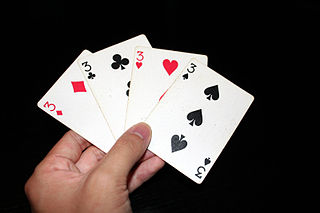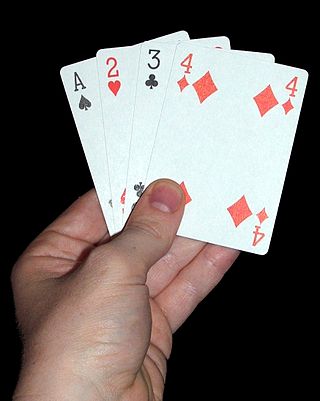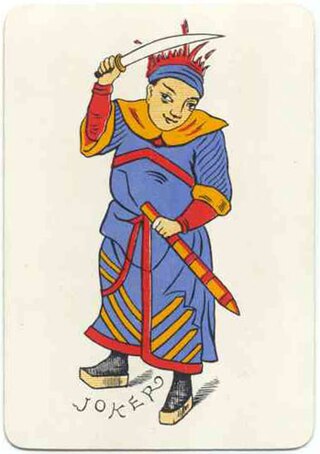
Omaha hold 'em is a community card poker game similar to Texas hold 'em, where each player is dealt four cards and must make their best hand using exactly two of them, plus exactly three of the five community cards. The exact origin of the game is unknown, but casino executive Robert Turner first brought Omaha into a casino setting when he introduced the game to Bill Boyd, who offered it as a game at the Las Vegas Golden Nugget Casino. Omaha uses a 52-card French deck. Omaha hold 'em 8-or-better is the "O" game featured in H.O.R.S.E.
Seven-card stud, also known as Seven-Toed Pete or Down-The-River, is a variant of stud poker. Before the 2000s surge of popularity of Texas hold 'em, seven-card stud was one of the most widely played poker variants in home games across the United States and in casinos in the eastern part of the country. Although seven-card stud is not as common in casinos today, it is still played online. The game is commonly played with two to eight players; however, eight may require special rules for the last cards dealt if no players fold. With experienced players who fold often, playing with nine players is possible.

Black Lady is an American card game of the Hearts group for three to six players and the most popular of the group. It emerged in the early 20th century as an elaboration of Hearts and was initially also called Discard Hearts. It is named after its highest penalty card, the Queen of Spades or "Black Lady". It is a trick-avoidance game in which the aim is to avoid taking tricks containing hearts or the Black Lady. American author and leading bridge exponent, Ely Culbertson, describes it as "essentially Hearts with the addition of the queen of spades as a minus card, counting thirteen" and goes on to say that "Black Lady and its elaborations have completely overshadowed the original Hearts in popularity."

Skat, historically Scat, is a three-player trick-taking card game of the Ace-Ten family, devised around 1810 in Altenburg in the Duchy of Saxe-Gotha-Altenburg. It is the national game of Germany and, along with Doppelkopf, it is the most popular card game in Germany and Silesia and one of the most popular in the rest of Poland. A variant of 19th-century Skat was once popular in the US. John McLeod considers it one of the best and most interesting card games for three players, and Kelbet described it as "the king of German card games."

Big two is a card game of Cantonese origin. It is similar to the games of Zheng Shangyou, daifugō, president, crazy eights, cheat, and other shedding games. The game is very popular in East Asia and in Southeast Asia, especially throughout mainland China, Hong Kong, Vietnam, Macau, Taiwan, Indonesia, the Philippines, Malaysia and Singapore. It is played both casually and as a gambling game. It is usually played with two to four players, the entire deck being dealt out in either case. The objective of the game is to be the first to play off all of one's cards.

Rummy is a group of games notable for similar gameplay based on matching cards of the same rank or sequence and same suit. The basic goal in any form of rummy is to build melds which can be either sets or runs and either be first to go out or to amass more points than the opposition.

Sheng ji is a family of point-based, trick-taking card games played in China and in Chinese immigrant communities. They have a dynamic trump, i.e., which cards are trump changes every round. As these games are played over a wide area with no standardization, rules vary widely from region to region.

Desmoche is a popular rummy card game usually played for small stakes which closely resembles other games in the rummy family, like Conquian and gin rummy, more than poker. It was probably devised in Nicaragua in the first half of the 20th century.

Tiến lên is a shedding-type card game originating in southern China and Vietnam. It may be considered Vietnam's national card game, and is also played in the United States, sometimes under the names "Viet Cong", "VC", "Thirteen", or "Killer".
Pusoy dos, a variation of big two, is a popular type of "shedding" card game that originates on the islands of the Philippines in Calauag, Quezon Province. The object of the game is to be the first to discard one's hand by playing them to the table. If one cannot be first to play all cards, then the aim is to have as few cards as possible. Cards can be played separately or in certain combinations using poker hand rankings. Games of Pusoy Dos can be played by three or four people.

Badugi is a draw poker variant similar to triple draw, with hand-values similar to lowball. The betting structure and overall play of the game is identical to a standard poker game using blinds, but, unlike traditional poker which involves a minimum of five cards, players' hands contain only four cards at any one time. During each of three drawing rounds, players can trade zero to four cards from their hands for new ones from the deck, in an attempt to form the best badugi hand and win the pot. Badugi is often a gambling game, with the object being to win money in the form of pots. The winner of the pot is the person with the best badugi hand at the conclusion of play. Badugi is played in cardrooms around the world, as well as online, in rooms such as PokerStars. Although it hasn’t had its own tournament per se at the WSOP, it is featured in the Dealers Choice events as well as in the Triple Draw Mix. The 2023 WSOP event does have a Badugi tournament scheduled.

Liverpool rummy is a multi-player, multi-round card game similar to other variants of rummy that adds features like buying and going out. It is played the same as Contract rummy, except that if a player manages to cut the exact number of cards required to deal the hand and leave a face-up card, then the cutting player's score is reduced by 50 points.

Switch is a shedding-type card game for two or more players that is popular in the United Kingdom, Ireland and as alternative incarnations in other regions. The sole aim of Switch is to discard all of the cards in one's hand; the first player to play their final card, and ergo have no cards left, wins the game. Switch is very similar to the games UNO, Flaps and Mau Mau, both belonging to the larger Crazy Eights or Shedding family of card games.
Svoyi Koziri, Svoi Kozyri or Vsyak svoi kozyri, is a Russian going-out card game for two players which some consider an elaboration of the Czech game Sedma. This game is one of perfect information and hence entirely of foresight and calculation. It differs from almost all other card games, in that the element of luck is eliminated, as, at any one time in the game, a player will know exactly which cards his opponent has.

Konter a Matt, Kontra a Matt or Konter a Midd is a Luxembourgish trick-taking card game played by four players. The game is popular enough to have been televised on RTL, Luxembourg's leading TV station and for tournaments to be organised. Konter a Matt is one of a family of similar games, known as the Couillon Group, played in the Benelux area. Other games in the family include the Belgian game of Couillon, known as Kwajongen in Flemish areas and Kujong in Luxembourg, the Dutch game of Troeven and the Belgian games of Brûte and Gamelle.

Gong Zhu (拱猪) is a Chinese four-player trick-taking card game that is similar to Black Lady, the leading member of the Hearts family. However, it differs in that it assigns quite different point values to cards. The objective of the game is to score positive points and avoid penalty points. Gong Zhu means: Chase the Pig, for "pig" is the name given to the Q♠.

Khanhoo or kanhu is a non-partnership Chinese card game of the draw-and-discard structure. It was first recorded during the late Ming dynasty as a multi-trick taking game, a type of game that may be as old as T'ienkiu, revised in its rules and published in an authorized edition by Emperor Kao Tsung in 1130 AD for the information of his subjects. Meaning "watch the pot", it is very possibly the ancestor of all rummy games.

German Rummy or Rommé is the most popular form of the worldwide game, Rummy, played in Austria and Germany. It is a game for 2 to 6 players and is played with two packs of French playing cards, each comprising 52 cards and 3 jokers. There are no partnerships. In Germany, the Germany Rummy Association is the umbrella organisation for local rummy clubs and organises national competitions. The game is often just known as Rommé in Germany and Rummy in Austria.

Newmarket is an English card game of the matching type for any number of players. It is a domestic gambling game, involving more chance than skill, and emerged in the 1880s as an improvement of the older game of Pope Joan. It became known in America as Stops or Boodle before developing into Michigan. In 1981, Newmarket was still the sixth most popular card game in Britain.
Within contract bridge a stolen bid is a bid which usually lacks connection to the bidders own hand, and instead is used for blocking a certain bid to be expressed from the next opponent. To "steal a bid" is mainly done when the opponent to the right has given a conventional bid which the opponent to the left is likely to reply to. By far, most stolen bids are related to the Stayman convention. But also other conventions where some kind of reply is expected, the "reply range" can at least in theory be stolen. Blackwood is another example of a convention that might be exposed to a stolen bid.















